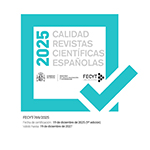Franquismo social y Ministerio de Trabajo (1939-1957)
Resumen
En este artículo se analiza la evolución del franquismo social entre 1938 y 1957, desde la promulgación en plena Guerra Civil del Fuero del Trabajo hasta la salida de José Antonio Girón de Velasco del Ministerio de Trabajo. En este período, el régimen, cuya legitimidad provenía exclusivamente del resultado de una guerra fratricida, intentó presentar un rostro social legitimador que atrajese al mayor número posible de desafectos. Para ello, temeroso de la fuerza del movimiento obrero en las fábricas y consciente del papel secundario del sindicato, compaginó represión con un modelo de política laboral y de previsión social gestado desde el Ministerio de Trabajo. El contraste entre el discurso social de la dictadura y las realizaciones efectivas de su política social no invisibiliza estas pero sí permite constatar la existencia de una zanja amplia separadora de relatos y resultados efectivos que el franquismo social recorrió gracias al recurso atemporal de la propaganda
Descargas
Descarga artículo
Licencia
La revista Sociología del Trabajo, para fomentar el intercambio global del conocimiento, facilita el acceso sin restricciones a sus contenidos desde el momento de su publicación en la presente edición electrónica, y por eso es una revista de acceso abierto. Los originales publicados en esta revista son propiedad de la Universidad Complutense de Madrid y es obligatorio citar su procedencia en cualquier reproducción total o parcial. Todos los contenidos se distribuyen bajo una licencia de uso y distribución Creative Commons Reconocimiento 4.0 (CC BY 4.0). Esta circunstancia ha de hacerse constar expresamente de esta forma cuando sea necesario. Puede consultar la versión informativa y el texto legal de la licencia.









